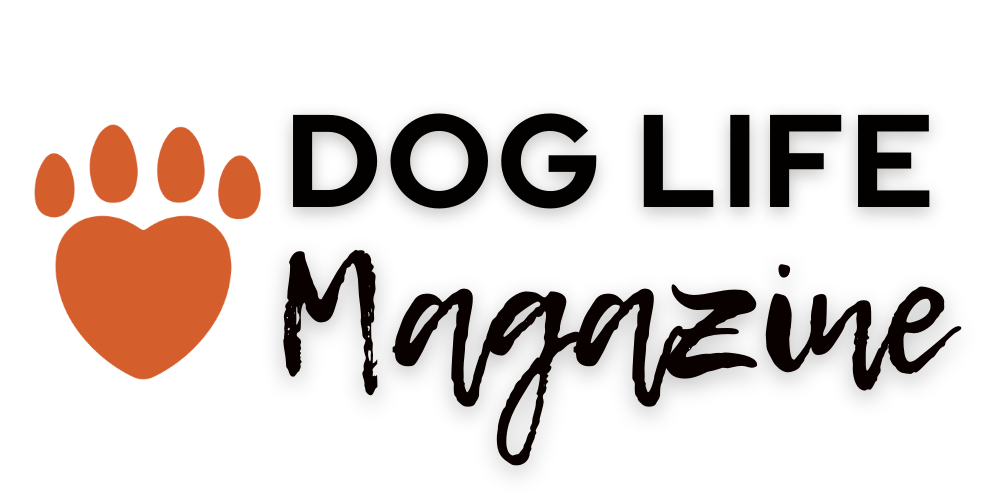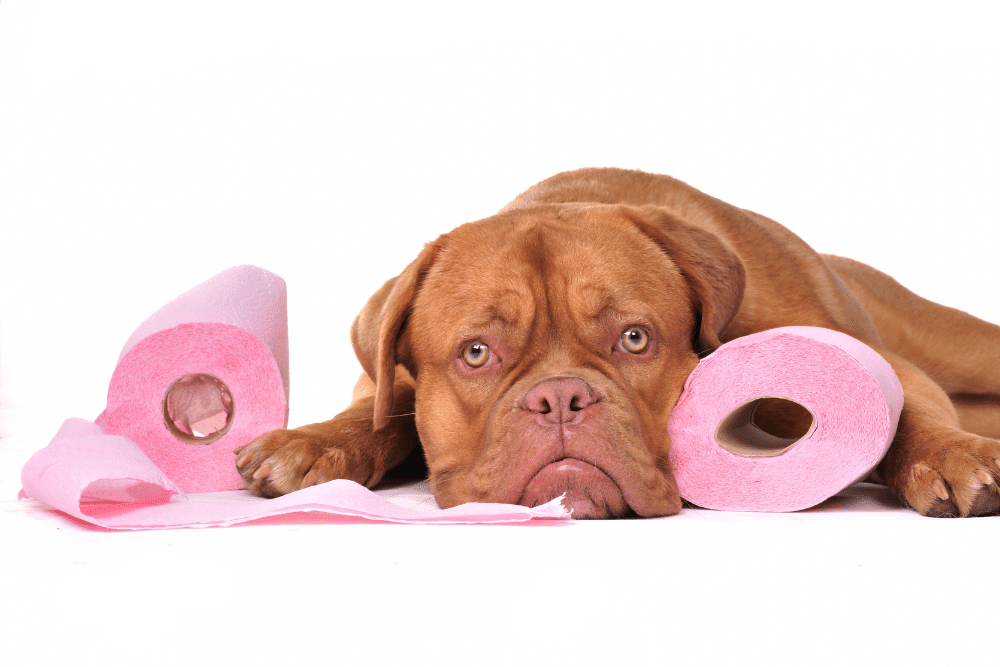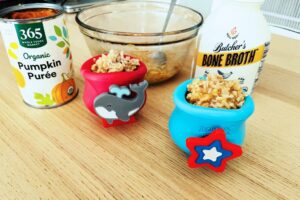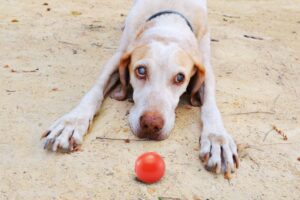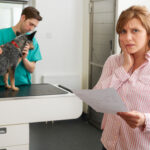Quite literally, it’s the crappy part of dog parenting. Call it what you will — the runs, the trots, flyarrhea, poop soup — it’s all just Urban Dictionary slang for diarrhea. And it’s the “Aahhh nooo!” inevitable that we all go through with our dogs at some point. Surely if you knew what causes diarrhea in dogs, you would screen every sniff, bite, chew, and social encounter to prevent it, right?
Oh, Grasshopper! If only life – and dogs – were so predictable!
Unfortunately, it’s going to happen, just as it does for humans. So you might as well put on your nose clip, keep some killer carpet cleaner on-hand, and learn the ins and (especially) outs of doggie diarrhea.
As much as we canine guardians can be guilty of anthropomorphizing our dogs, we have a responsibility to acknowledge our differences. And dogs and humans are very different.
What causes diarrhea in dogs may sound logically familiar to the human experience in some cases. Stress, bad food, a sudden and extreme change in diet, illness, etc.
But it’s important to remember that a dog’s GI tract doesn’t mirror that of a human beyond basic construction.
Our pals have predatory ancestors that ripped apart flesh, organs, and bones and swallowed large pieces whole. Their jaws, teeth, and gastrointestinal processing catered to a this-could-be-my-last-meal-for-a-while instinct. Wolf it down (literally and figuratively) and leave nothing for the competition.
The closest we humans come to this dining approach is grabbing a supersized meal at the drive-thru and devouring it on the road with a wash-down of soda.
And we often pay the price later.
For humans, the digestive process begins in the mouth. We chew and swish and talk with our mouths full, all while our saliva is starting the breakdown to swallowable portions.
Dogs, on the other hand, are on a mission: Eat like there’s no tomorrow.
Apparently thousands of years of domestication haven’t changed that.
The canine stomach is a major deconstruction zone. A dog’s stomach acid is three times as strong as that of a human and can break down things our stomachs can’t.
Transit time is also shorter for dogs. Their GI tracts, which include a relatively short small intestine, are like an Amazon warehouse compared to ours. Order in, order processed, on your doorstep eight hours later.
The human GI tract is the Pony Express by comparison.
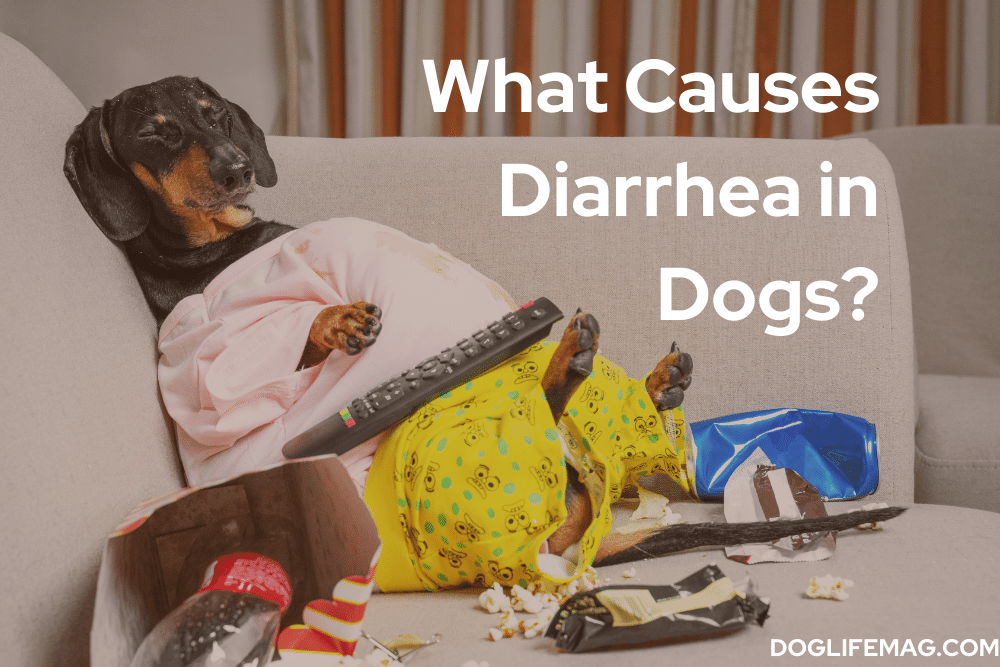
What causes diarrhea in dogs?
Here are some of the most common causes:
-
Eating garbage or spoiled food.
Veterinarians see it so often they have coined it “garbage gut.”
Dogs who raid your trash can, dogs who are forced to live outside, dogs who are lost and foraging – they’re all prime candidates for the runs.
-
Drinking contaminated water.
Dogs can become very sick from ingesting water from natural sources – lakes, rivers, ponds, puddles, etc. – especially if the water is still.
These can be sources of Giardia, Leptospirosis, and Blue-Green Algae, all of which can cause diarrhea and even death.
Even if you don’t let Rover lap from the banks, he will inevitably ingest water if allowed to swim in bodies of natural water.
-
Stress or anxiety.
Dogs experience stress just as humans do, albeit for different reasons.
Being confined to a noisy shelter, being rehomed and moved between strangers, going to the vet, traveling in a car – it’s all stressful. And some dogs suffer separation anxiety when left alone.
-
Sudden change in diet.
Dogs in rescue are a prime example of how diet changes can lead to GI upset and diarrhea.
Shelters feed whatever they have and can afford. Then, if a rescue or foster family steps up, the dog is likely to experience another diet change. It all makes for gastronomic and gastrointestinal mayhem.
If a diet change is warranted, it’s always best to make the change gradually by “cutting” the old food with the new food. And for a printable list of what foods dogs can and can’t eat, download our free what can dogs eat checklist.
-
Parasites.
Dogs who live outside, are found as strays, frequent dog parks, and/or do not receive monthly parasite preventatives (Link to article on Flea and Tick remedies) are susceptible to parasites.
The most common include hookworms, roundworms, whipworms, Giardia, and Coccidia.
If you have helped save a dog’s life by adopting through a shelter or rescue, you can probably attest to the early days of diarrhea and deworming.
-
Viral infections.
Parvo and distemper are both highly contagious and potentially fatal viruses that are especially dangerous to puppies.
Pups should never be taken into public places or around other animals until they are fully vaccinated.
-
Ingesting toxins or poisons.
Not everything that is toxic to your dog will be marked with a skull-and-crossbones.
That heaven of a backyard could be full of dangers that only you can prevent.From pesticides to fertilizers to a host of toxic plants, Rover’s curious sniffer can get him into serious trouble.
Be sure to pull up this list of toxic and non-toxic plants, courtesy of the ASPCA, when you are planning your landscaping. And, of course, keep all medications and chemicals out of paws’ reach inside your home.
-
Medications.
Some antibiotics and NSAIDS like Rimadyl/Carprofen, as well as chemotherapy drugs, can cause diarrhea in dogs.
-
Illness or disease.
Colitis, pancreatitis, GI/colon cancer, liver or kidney disease – all create an unstable, unhappy state in your pup’s GI tract.
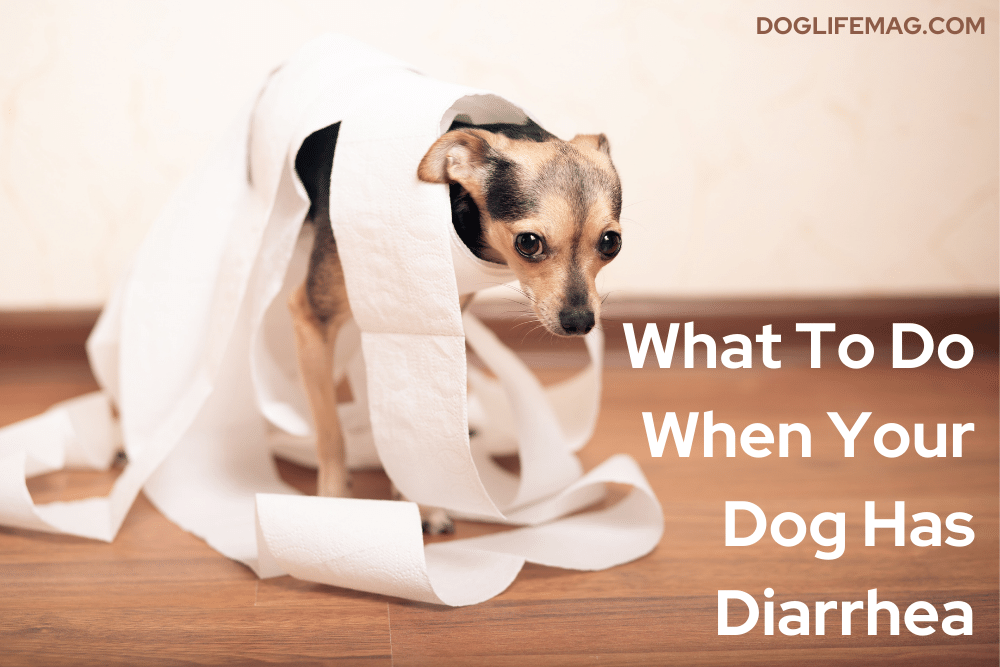
What to do when your dog has diarrhea
Now that you know what causes diarrhea in dogs, what should you do when you’re staring at a brown puddle?
Well, given that picking it up with a poop bag is out of the question, you might as well take a Sherlock gander at it. Poop in all its forms always has a story to tell, and you can help both your vet and pooch by having the diarrhea 411.
Look for anything unusual in the puddle before cleaning it up – blood, mucus, worms, pieces of an ingested no-no. If there is anything that just seems not-right, take a photo, save it to Rover’s Poop Pics file, and email it to your vet.
Watch your dog closely for the next day, and, if he has more than one bout of diarrhea, take him in.
In the meantime, consider a bland diet or a 12-24-hour fast with frequent, small amounts of water. Of course, be sure your dog is healthy enough for a fast before withholding food.
While diarrhea is common in dogs, it can also signal something more serious.
Dog owners should take it as “all part of the deal” to look at their dogs’ output. Consider it just another form of communication with your dog…and a picture that’s worth a thousand yelps.
